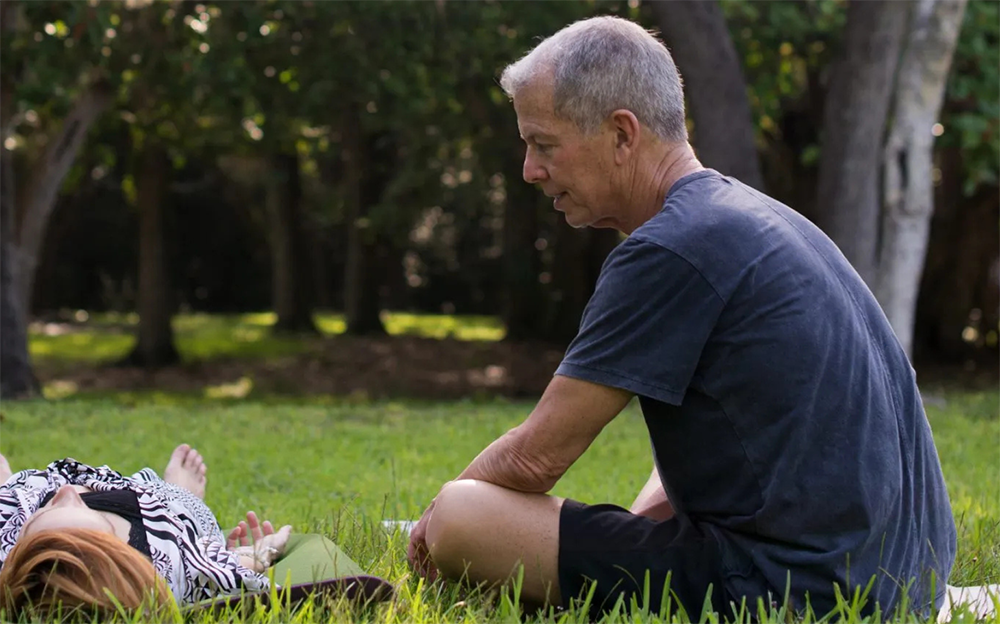Breathwork has gone from a “niche wellness thing” to something people are taking seriously; athletes, therapists, doctors, corporate leaders, stressed-out parents, you name it. And honestly, it makes sense. Everyone breathes, but very few actually know how.
Deep breathing for anxiety, performance, sleep, and emotional regulation has become a go-to tool for millions of people, mostly because it’s simple, free, and actually works when done right.
Because of all this, the demand for trained breathing coaches has jumped. Not the “random people on social media” kind, but certified, skilled practitioners who understand technique, physiology, and how to guide people safely.
So if you’re thinking about getting a breathing coach certification, the big question is probably sitting right in front of you:
“What can I actually do with this?”
Let me show you the options available to you that most people pursue once they have their breathing coach certification.
Why Breathwork Coaching Is Growing Fast
Ten years ago, breathwork was mostly tied to yoga classes or niche meditation groups. Now? It’s everywhere. The reasons are pretty simple:
1. Anxiety and stress levels are hitting all-time highs.
People are searching for tools that actually help. And deep breathing for anxiety is one of the few things people can feel working almost instantly.
2. It pairs well with almost every field.
Therapists use it. Coaches use it. Sports trainers use it. Even business leaders are starting to bring breathwork into team culture.
3. It doesn’t require a massive setup.
No special equipment is needed. No complex environment. A trained coach can work online or in person with the same level of impact.
4. People trust real training now.
There are too many amateurs teaching breathing methods they barely understand. Clients want coaches who have done the work, studied, practiced, and trained properly. Programs like the Breathmastery Practitioner Program exist for exactly this reason.
So, breathwork is no longer a side hobby. It’s becoming a real profession and a very flexible one.
What You Actually Learn in a Good Certification Program
A strong, well-structured breathing coach certification is more than learning a few calming techniques. A qualified certification program should be well-rounded in all aspects of breathing. The program should include topics such as how breathwork affects:
- physiology
- stress response
- emotions
- focus
- energy
- sleep
- trauma patterns
- athletic performance
You also learn how to guide people, assess breathing habits, hold safe sessions, and build a real practice.
For example, the Breathmastery Practitioner Program gives you a full foundation in breathing mechanics, technique variety, coaching formats, psychology, assessments, and the practical skills to develop a career. It’s not a quick weekend workshop and done. It’s a deeper path.
But the big question remains:
What Career Opportunities Open Up After Getting Certified?
Plenty. More than most people expect. And they’re not limited to the wellness industry. You can work independently, join existing organizations, or blend breathwork into your current career.
Let’s go through the real paths people take.
1. Private One-on-One Breathwork Coaching
This is the most straightforward route. You work with clients individually online, in person, or both.
People come to private breathwork sessions for reasons like:
- anxiety or chronic stress
- sleep problems
- emotional regulation
- burnout
- performance optimization
- energy and focus training
- breath pattern retraining
This path allows for more personalized work, deeper impact, and usually higher earning potential per session.
Why it works well:
People want stability and trust. They want someone who actually understands breathing, not someone reading a script.
Who this fits:
Coaches who enjoy working closely with individuals and prefer flexible hours.
2. Group Classes and Workshops
Group settings work incredibly well because breathwork has a shared energy. Many people feel more comfortable joining a group rather than starting alone.
Group formats include:
- weekly classes
- stress-relief sessions
- breathwork for anxiety workshops
- deep breathing for anxiety classes
- breathwork for beginners
- corporate team sessions
- athletic breathing clinics
This is a great option if you like speaking to a room, guiding groups, and creating a shared experience.
Earning potential example (rough but realistic – pricing varies due to many factors):
- 20 people in a class
- $25–$40 per person
- 1-hour class
These add up quickly, especially if you run them consistently.
3. Corporate Wellness and Workplace Training
Companies are investing in wellness more than ever. Stress, emotional exhaustion, and burnout affect performance, and breathwork helps reduce them.
Breathwork fits easily into:
- corporate workshops
- leadership development
- stress-management programs
- team-building sessions
- pre-meeting breathing routines
- productivity and focus training
Many companies now invite breathing coaches for monthly sessions or short-term programs.
Why this is a strong opportunity:
Corporations have a budget. And they prefer certified professionals.
4. Integrating Breathwork Into an Existing Profession
One of the best things about breathwork is how easily it blends into another field.
After getting a breathing coach certification, many people don’t switch careers; they enhance the career they already have.
Examples:
- Yoga instructors add breathwork modules.
- Therapists introduce breathing for emotional balance.
- Massage therapists use breathwork to help clients release tension.
- Nurses and healthcare workers teach patients simple breathing tools.
- Fitness trainers improve client endurance and recovery.
- Life coaches help clients manage anxiety and build mental resilience.
- School teachers use breathing to help students concentrate.
Adding breathwork makes you stand out in your field and gives clients more value.
5. Working With Athletes and Sports Teams
Athletes use breathwork for:
- lung capacity
- endurance
- recovery
- focus
- emotional control under pressure
- energy management
Sports psychologists, trainers, and coaches are increasingly turning to breathwork tools. If you enjoy performance-based work, this is a strong niche.
6. Health and Rehabilitation Support
Breathwork can complement traditional medical or therapeutic approaches. While coaches don’t diagnose or treat medical conditions, they help clients:
- calm the nervous system
- reduce stress responses
- regulate breathing patterns
- build awareness
- support sleep
- manage anxiety
- improve recovery environments
Breathing coaches work with rehab centers, wellness clinics, mental health experts, and chronic stress programs.
7. Online Courses, Memberships, or Digital Products
This is an area with massive growth. Once you’re experienced and comfortable teaching, you can create:
- online breathing programs
- guided breathing audios
- video courses
- memberships
- monthly subscription communities
- email-based breathing series
Breathwork translates extremely well to digital platforms.
You can reach more people and create passive or semi-passive income.
 8. Retreats, Events, and Immersive Training
8. Retreats, Events, and Immersive Training
People love immersive breathwork experiences because they get to disconnect from daily stress.
Retreat formats might include:
- weekend breathing retreats
- breathwork + meditation trips
- wellness retreats with multiple modalities
- high-performance training weekends
- emotional release breathwork experiences
These can be local or international. Retreats typically include breathing sessions, movement, nature work, and guided practices.
9. Collaborating With Other Wellness Professionals
Breathing coaches often partner with:
- chiropractors
- physical therapists
- mental health counselors
- nutritionists
- yoga studios
- wellness centers
- integrative health clinics
This gives you access to clients who already value wellness and are open to breathwork.
10. Becoming a Trainer, Mentor, or Program Instructor
Once you’ve built enough experience, you can move into teaching other coaches. Programs like Breath Mastery are built around decades of experience, and many certified coaches eventually support training, mentoring, and instruction.
This is the long-term path for people who want to shape the future of breathwork as a field.
So… Are There Enough Opportunities to Make This a Real Career?
Absolutely, but it depends on you, your training, your consistency, and your willingness to practice and keep learning.
A breathing coach certification gives you:
- technical skills
- confidence
- guidance
- structure
- safety understanding
- a recognized credential
- community support
- a foundation to build a practice
But what really makes the difference is how you show up once you’re trained.
Breathwork is not built on hype. It’s built on trust. People choose a coach who is stable, trained, grounded, and reliable.
If you’re willing to build those qualities and keep showing up, there’s a lot waiting for you on the other side.
How to Choose the Best Certified Breathwork Coaching Online Program
Choosing the right certified breathwork coaching online program is essential for building strong foundations as a professional breathwork facilitator. Start by examining the curriculum to ensure it covers core areas like breath physiology, trauma-informed practices, breathwork techniques, and session facilitation. A reputable program should provide both theoretical knowledge and practical training through live classes, practice sessions, and mentorship opportunities.
Accreditation and instructor expertise are also key factors—look for programs led by experienced breathwork teachers with recognized credentials. Flexibility matters too, especially if you’re balancing certification with work or personal commitments, so ensure the online schedule and learning format fit your lifestyle.
Lastly, choose a program that offers ongoing support, community access, and business training to help you launch or grow your career. By selecting a high-quality certified breathwork coaching online program, you set yourself up for long-term success in the wellness and healing industry.
The Overlooked Advantage: Breathwork Helps YOU First
Here’s something many people don’t say out loud:
Before you help others, breathwork changes your own life.
You learn how to calm your nervous system.
You handle stress differently.
You stop reacting automatically.
You breathe better, think clearly, and sleep more deeply.
Deep breathing for anxiety becomes something you don’t just teach; you rely on it in your own day-to-day life.
When your own breathing is steady, your coaching naturally becomes stronger. People feel that calm energy from you.
Choosing the Right Certification Actually Matters
Not all certifications are equal. Some are quick weekend courses. Some barely scratch the surface. Some teach only one style. Some skip science. And some skip safety entirely.
A deep, structured program like the Breathmastery Practitioner Program gives you:
- a full year of training
- step-by-step techniques
- real breathing assessments
- coaching calls
- live sessions
- spiritual psychology
- practical applications
- business fundamentals
- mentorship from decades of experience
This is what prepares someone for a long-term career, not just a short workshop.
If your goal is to guide others responsibly and professionally, quality training is everything.
Final Thoughts
You can’t build a career in breathwork by pushing content or striving to seem “perfect.”
Genuine interest and human connection build them.
People come to breathwork when they’re exhausted, nervous, or looking for relief. It may be one of the most fulfilling careers to help others reconnect with themselves and make a difference.
With the right breathing coach certification, the opportunities are genuinely wide open.
If you’re ready to explore breathwork more deeply or want to see what real training looks like, you can start here: Breath Mastery.
FAQs
1. Do you need a background in wellness or healthcare to become a breathing coach?
No. People join from all kinds of backgrounds, including teachers, parents, athletes, entrepreneurs, therapists, and complete beginners. A strong certification program teaches you everything from the ground up.
2. Can deep breathing for anxiety really help clients?
Yes, when taught correctly. Deep breathing helps calm the nervous system, slow stress responses, and steady the mind. It doesn’t fix everything, but it’s one of the most accessible and reliable tools people can learn.
3. How long does it take to build a career after getting certified?
It varies. Some coaches start working with small groups or clients within months. Others take time to practice and gain confidence. A year-long certification like Breathmastery gives you enough structure to start building steadily.
4. Can you make a full-time income as a breathing coach?
Absolutely. Many coaches run private sessions, group classes, corporate workshops, retreats, and online programs. Income depends on your commitment, consistency, and willingness to keep learning, but the earning potential is solid.
